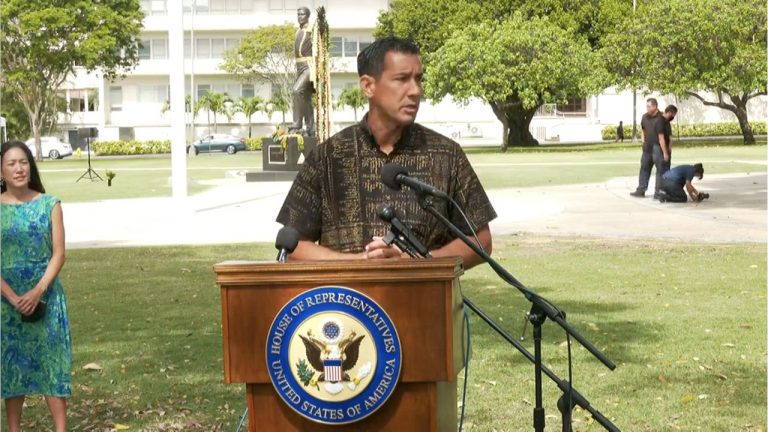HONOLULU — Hawaii Congressman Kaialiʻi Kahele announced federal legislation to restore Mākua Valley on Thursday at Thomas Park.
The Leandra Wai Act would return Mākua Military Reservation to the state.
“This legislation is a step towards writing the decades worth of wrongs committed against Native Hawaiians and Hawaii’s environment by the United States military,” Kahele said. “Makua is a sacred site rich in cultural significance and biological resources. It is a site in one of Native Hawaiians most important traditional oral histories.”
He said decades of military occupation and live-fire training within Mākua Valley have caused serious damage.
“Beyond the environmental degradation, the military occupation of these lands have cut off Native Hawaiians from full access to cultural practices,” Kahele said.
The bill is named for Leandra Wai, a Native Hawaiian cultural practitioner and former president of Mālama Mākua, a nonprofit started in 1996 that has worked to restore Mākua Valley. A lawsuit filed on behalf of the organization led to the end of the live-fire training within the valley in 2004.
The Leandra Wai Act would require the Department of Defense to work with the state to provide a cost estimate and cleanup schedule for Mākua Military Reservation.
It would allow the transfer of 782-acres within Mākua back to the state under the Comprehensive Environmental Response, Compensation, and Liability Act but exempt it from a provision that requires remedial actions to be completed before the transfer.
According to the bill, the Department of Defense must abide by CERCLA after the title transfer and would remain liable for the unexploded ordinances and other contaminants within Mākua Military Reservation.
Lastly, it would direct the Army Secretary to enter into a Memorandum of Understanding with the State of Hawaii to establish a Mākua Valley Conveyance Remediation and Environmental Restoration Trust Fund. The Army Secretary would be required to consult with Native Hawaiian organizations while creating a plan to remove unexploded ordnance and other contaminants.
Kahele likened Mākua Valley to Kahoʻolawe, which was used as a military training site for decades until it was returned to the state in 1994 and it is now stewarded by a Hawaiian organization. He also compared the site to the Navy’s Red Hill Storage Facility.
“The United States military does not need this land. They do not need Makua just like they do not need Red Hill,” said Kahele, referring to where the Navy stores fuel, which leaked into the island’s aquifer and is now in the process of being shut down. “This bill is a reminder to the United States military and the Army, that they work for the people, that they are accountable to the people and that they cannot continue to harm our land and cultural resources unchecked.”




